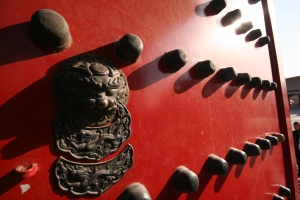
Open the Door to Business Success in China
Conducting business in China can be a confronting affair, with the rules of engagement vastly different from what we would expect in many western countries. The number one rule when conducting business in China is to take it slow, develop your reputation or Guanxi, and build your relationships with the people you meet, whether they be business or government officials. Business deals can be, and will be formed in a variety of locations and environments, and the relationships you develop at the Chinese banquet table can be crucial for long term success.
Banquet settings will obviously change depending upon the people you are meeting, the location of the banquet or the food variety on offer. However some things never or rarely change.
The banquet table will in many cases be a round table, large enough to seat up to 14 people. The host of the Banquet is the most important person in the room, and their seat will be at the head of the table…which at a round table may be against the wall, allowing for the host to look into the room and see all the guests easily. The next most important host will be seated directly opposite the host at the foot of the table. The most important guest will be seated to the right of the Host, with the second most important guest to the left. If Interpreters are required then they will be seated next to the guests, to allow for easier conversation. The third and fourth most important guests will be seated in a similar formation at the foot of the table. The other important hosts will be seated at the wings of the table. It is always best to wait until you are invited to sit at the table, this will allow you to observe how important you are perceived by the Chinese Host of the banquet.

Is it half full? or just enough?
On the table will be placed wine glasses, and a waiter will come around with a decanted wine (depending upon the company this could be beer, rice wine or barley spirit), and pour approximately two mouthfuls of wine (about 60mls) into each glass on the table. The head of the table will indicate that he is going to propose a toast, upon which everyone present should stand. The host will then propose a toast to enduring friendship and successful business and glasses should be raised and ‘clinked’ with each member of the banquet in turn, ensuring that the glasses were clinked as low as possible and gently. Once everyone has ‘clinked’ their respective glasses, you must drink the contents of the glass. The glasses will be promptly refilled as before, and the second host will propose a similar toast. The same ritual will then ensue. The Chinese Banquet is as much about drinking as it is about the food. The drinking is ritualistic and reinforces the hierarchy present at the banquet table.
Following the formal group toast, the host will likely toast the guest to his right, with a speech about friendship and a personal welcome, this will indicate to all that this guest is the

Ritual symbolism is everywhere in China
most important guest at the table. The ritual will then be carried out with the second guest. It is then likely that the host will propose a toast to the second host. This will reinforce that the second host is equally important, and essentially this has passed the baton to him to start his own round of toasts to the guests beside him. It is at this point that some food may start to appear on the table, for sharing. If you are going to China, learn to use chopsticks, as failure to adequately manage them will confirm to those present that you are indeed a Barbarian…..In essence it is not much different in western cultures to eating with your hands at a fine dining restaurant.
Conversation will be necessarily small talk and informal in most cases, and it is not appropriate generally to talk formally about business. The important thing is to build your relationship, and allow your host to understand who you are and what you stand for as a person. And this leads us to the final point in the art of the Chinese banquet. As in many cultures, alcohol is known to loosen the tongue, and so your host may strategically arrange toasts so that you drink more than you should, and then say more than you should. Hold your own, and try not to become too loud or obnoxious. There is no surer way of killing a deal than to be rude and offensive at the Formal Chinese Banquet.



